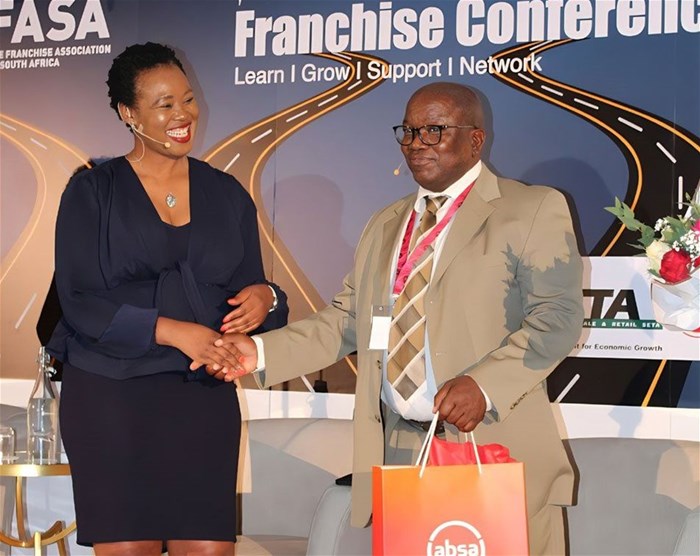
Related
Top stories





Marketing & MediaAds are coming to AI. Does that really have to be such a bad thing?
Ilayaraja Subramanian 16 hours

More news
















Minister Stella Ndabeni-Abrahams urged the Franchise Association of South Africa (Fasa) to engage with her department to provide a more comprehensive business support system and improve access to effective participation of small, medium-sized and microenterprises (SMMEs).
At Fasa’s recent Franchise Conference, the Minister confirmed that government would work with Fasa and other partners to ensure the industry benefitted all stakeholders, whilst maintaining franchising’s inherent set of ethical and business practices, and mitigate inherent risks especially when it comes to financing.
Referring to the South African SMMEs and Cooperatives Funding Policy that was recently gazetted for public comment and would be presented to the National Economic Development and Labour Council (Nedlac), Minister Ndabeni-Abrahams called for an increased focus by government in supporting SMMEs to create jobs through certain reforms, including procurement and access to funding.
Commenting on a long-held view that the mainstream franchise market remained expensive and out of reach for the majority of potential entrepreneurs, Ndabeni-Abrahams confirmed that this required deliberate efforts by stakeholders in the ecosystem to address the barriers to entry.
Since its formation 44 years ago, Fasa has steered franchising to be one of the most successful sectors in our economy – contributing more to the country’s GDP than many other important sectors like mining, manufacturing and agriculture.
Fasa knows that, if mobilized effectively and given the right operating environment, franchising, in all its formats including micro, social and tandem franchising, can make a marked difference. But what is needed is less red tape, more functional municipalities, a conducive operating environment and better funding.
The Minister welcomed FASA’s offer to assist government in exploring innovative franchising models and also acknowledged the challenges facing entrepreneurs in these groups, such as infrastructure impediments and high crime in townships.
“The hard facts on the ground are that the economy is in crisis and we urgently need recovery plans...to support business growth and create jobs NOW... not in five or ten years’ time” says Maria D’Amico, Fasa’s Chair.
“Fasa has, over the years, proposed and introduced various training cadet programmes and business development initiatives to open up franchising to new markets and to new participants. Sadly, changes in government departments and re-deployment often resulted in projects not being completed, being abandoned or not even being considered. Whilst we applaud President Ramaphosa finally recognising the seriousness of the situation, bringing together both public and private role-players to implement the energy, safety and logistics crisis plan, the same seriousness must be given to reviving the SMME Master Plan and taking it beyond just being another fanciful document gathering dust.”
The franchise sector can play an important role in nurturing the entrepreneurial spirit that has made us such a force in the business world. Fasa’s 2023 survey results show that the franchise business format is resilient and perfectly geared to assist in small business development, skills transfer and above all, in job creation.
At Fasa’s Franchise Conference which unveiled its definitive survey of the sector and how it coped over the past four years of Covid restrictions, riots, flooding and economic uncertainty, speakers and delegates alike came to the conclusion that franchising, by virtue of its strong business model and the power of the collective, was inherently sound and could withstand immense pressures.
Says James Noble, Head: Wholesale, Retail and Franchising at Absa, who sponsored the Fasa survey and conference, “We went through the 1998 economic meltdown and the 2008 financial crisis – both had a significant impact which in a way prepared us for the impact of Covid-19. During the pandemic we were called in to do a lot of scenario planning to assist our clients. If there was one thing that the past four years taught us was that everyone learned to collaborate; franchisors, franchisees, suppliers, key stakeholders had to come together and work together to find new ways of doing things.”
Whilst the survey showed an industry that grew in estimated turnover generated - from R734bn in 2019 to R999bn in 2023, going from contributing 13, 9% to 15,0% to the country’s GDP - the one downward trend was the drop in the number of franchise systems coming on board – dropping from 813 in 2019 to 727 in 2023. This was probably due to the uncertainty of the past four years that has impeded new franchise concepts coming to light and perhaps is also a result of struggling newcomers having to shut their doors.
Fasa’s CEO Fred Makgato warns that this lack of growth in the establishment of new franchise and business systems must be urgently addressed as entrepreneurship is the life blood of any economy, as it stimulates small business development, skills transfer and ultimately job creation.
He believes that the only way to avoid an impending disaster in South Africa is for the government to deal with load shedding and to recognize that it is the businesses, both large and small especially that are keeping the economy going.
“On the back of such a strong survey of the franchising sector, that is prepared to safeguard its position as a significant contributor to the country’s economy and is willing to play its part to keep the wheels of business and entrepreneurship turning, we call on government to now do their part in rectifying the debilitating state of the country for the sake of the economy, its citizens and the future of South Africa.”